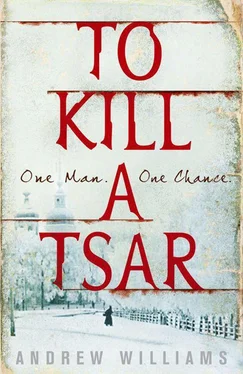‘You!’ How absurd. ‘Dobrshinsky won’t thank you for frightening me to death, my friend.’
The informer took a step closer. He had a thin face, serious, clean-shaven, with large brown eyes, his long hair swept back from his forehead. He was dressed in what may once have been a student uniform.
In the seconds it took to look him up and down Hadfield recognised he had made a foolish mistake.
‘In the name of the executive committee of The People’s Will, you are… you—’ The student’s voice shook uncontrollably with fear. He was fumbling in his coat pocket. A knife? A gun? Hadfield threw himself forward, driving the student to the ground, punching his face with his right hand, pinning his arm to his side with his left. The young revolutionary cried out in pain as his head struck the icy pavement. And Hadfield grabbed at his hair, swinging his head and banging it down hard again.
‘You hopeless bastard!’ he snarled through gritted teeth, enjoying the power, the excuse to punch, hurt, make the man cry out in pain. ‘You hopeless, feeble little bastard.’ And he struck him in the face again and felt his nose fracture.
‘Does she know?’ he shouted, his voice husky with rage. The student began to whimper. ‘Shut up, you coward. Does she know?’
But his words were lost as a wave of incandescent pain broke behind his eyes and washed through his body. He must have crashed sideways on to the pavement because, as the pain began to recede, he saw the student lying curled in a ball at his side. Then someone kicked him in the chest and for a second his heart skipped a beat. Voices — two, three men, working men.
‘Go on. Finish it.’
Rolling away, Hadfield tried to rise but was thrown back by a crushing blow, a fist like a hammer. One of them aimed another kick at him and in desperation he grabbed the man’s boot, trying to drag him down.
Fight. Fight. Don’t die. But one of the others kicked him in the back and he let go, gasping for air. Don’t die. Don’t. It beat in his mind through the pain. And with the strength of fear he began to rise again, clutching at someone’s legs, head bent against their fists. They want to crush me. Blow after blow, his head, his sides. They are going to murder me. I’m going to die on the pavement outside the House of Academics. The will of the people. No fear, no pain now, only the jarring of his body and a struggle for breath at the edge of consciousness. And he began to float with Anna, with her playful smile and blue, so blue eyes. But a moment later she was lost to a dazzling light. And then the light was lost to darkness.
‘Is he dead?’
‘As dead as it is possible to be, Your Honour.’
‘Let me see.’
The heavy iron door opened with a squeak and the warder stepped inside with his lamp, the circle of light creeping up the back wall of the cell. Grigory Goldenberg was hanging from the bars of the little window, his head twisted to one side, his tongue lolling thick and blue from his mouth, wispy red hair plastered across his forehead. His eyes had rolled upwards in his last moments, as if he was beseeching his god. He looked like a badly made marionette.
The party’s little puppet, Collegiate Councillor Dobrshinsky thought with distaste, a dangerous enthusiast with a craving for active service and an inflated sense of his importance. It had taken time, but he had been able to turn him to good effect. A list of over a hundred names, descriptions, addresses and pages and pages of evidence. Yes, the little fanatic had done him a very good turn. Drenteln had gone but Dobrshinsky stayed, and the new man in charge of the Third Section had given his investigation fresh impetus.
‘When?’ he asked, turning to the warder.
‘No more than two hours ago, Your Honour.’
‘Does anyone know why?’
‘He heard of the arrests from one of the other prisoners. He said he’d been tricked. Guilt, Your Honour. Guilt.’
Dobrshinsky took a step closer. Goldenberg’s life had been choked from him. Only great despair and a supreme act of courage could have driven him to it. A prison towel torn into strips to make a rope, dangling from the bars, his hands loose at his side, his feet only inches from the floor.
‘Cut him down and clean up the cell,’ Dobrshinsky said, turning his back on the corpse. ‘It could have waited until the morning.’
But it was not the end of the collegiate councillor’s day. Just as his carriage was drawing to a halt in front of his home, the porter came scuttling down the steps to greet him with a note.
‘I was to deliver it as soon as you returned, Your Honour,’ he wheezed asthmatically. ‘I’ve been waiting these last two hours.’
‘Before I’ve had a chance to step from my carriage and take off my hat and coat?’
Dobrshinsky pulled off his gloves and, with a hand that seemed to tremble a little, he took the letter and broke the seal. He read it, then sat back in the carriage for a moment, his eyes closed, pinching the bridge of his nose.
‘You did the right thing,’ he said at last, and he took a few kopeks from his pocket and dropped them into the porter’s hand: ‘For your trouble.’
Major Vladimir Barclay was waiting for him in the office of the assistant superintendent of the Nikolaevsky, dozing at the stove, an empty glass of tea balanced precariously on the arm of his chair. Dobrshinsky took the precaution of removing it before he shook him gently by the shoulder.
‘Anton Frankzevich, Your Honour,’ he said, rising blearily to his feet.
‘Where is our doctor?’
‘His Excellency General Glen was here, and the first secretary from the British embassy,’ said Barclay, doing up the buttons of his jacket.
The assistant superintendent had informed him Hadfield was suffering from a severe head injury, broken ribs, bruising to the chest and back and broken fingers. The head injury was causing particular concern.
‘And where is the general?’ asked Dobrshinsky.
‘He’s gone home, spitting fire, and says he’ll be back in the morning.’ Barclay grimaced at the thought. ‘He’s going to speak to His Excellency, Count Loris-Melikov, and to His Majesty too. He’s convinced the terrorists want to murder him and his family. He’s insisting on a police guard. He seems to blame us.’
The special investigator smiled at the aggrieved note in his voice. ‘My dear Barclay, surely you didn’t expect anything else?’
‘Some gratitude, Your Honour. They would have stuck his nephew like a pig if our fellow hadn’t stepped in to save him. I tried to tell His Excellency—’
‘Tell me.’
Agent Sudeikin of the Third Section had been following the doctor since the explosion at the palace but had lost him that night on the Nevsky Prospekt.
‘Not for the first time,’ Dobrshinsky observed dryly.
Sudeikin had noticed that a student was following the doctor too but he had not had the wit to associate him with The People’s Will.
‘And to be fair to Sudeikin, he doesn’t look the sort of fellow they would trust with this sort of task,’ said Barclay. But the student had three burly factory workers with him who were more than capable of kicking a man to death. Agent Sudeikin had come upon them as they were preparing for the coup de grâce , and had fired his revolver, wounding one in the arm and driving all but the student away.
‘The doctor gave the fellow such a beating he was not in a fit state to run. He’s in a cell at the Preliminary. He hasn’t said more than that he’s an agent of The People’s Will.’ Barclay chuckled: ‘Looks as if he’s been kicked by a horse.’
Dobrshinsky frowned thoughtfully, his head bent a little, staring at nothing in particular.
‘It’s puzzling,’ Barclay offered. ‘I was sure he was one of them.’
Читать дальше












